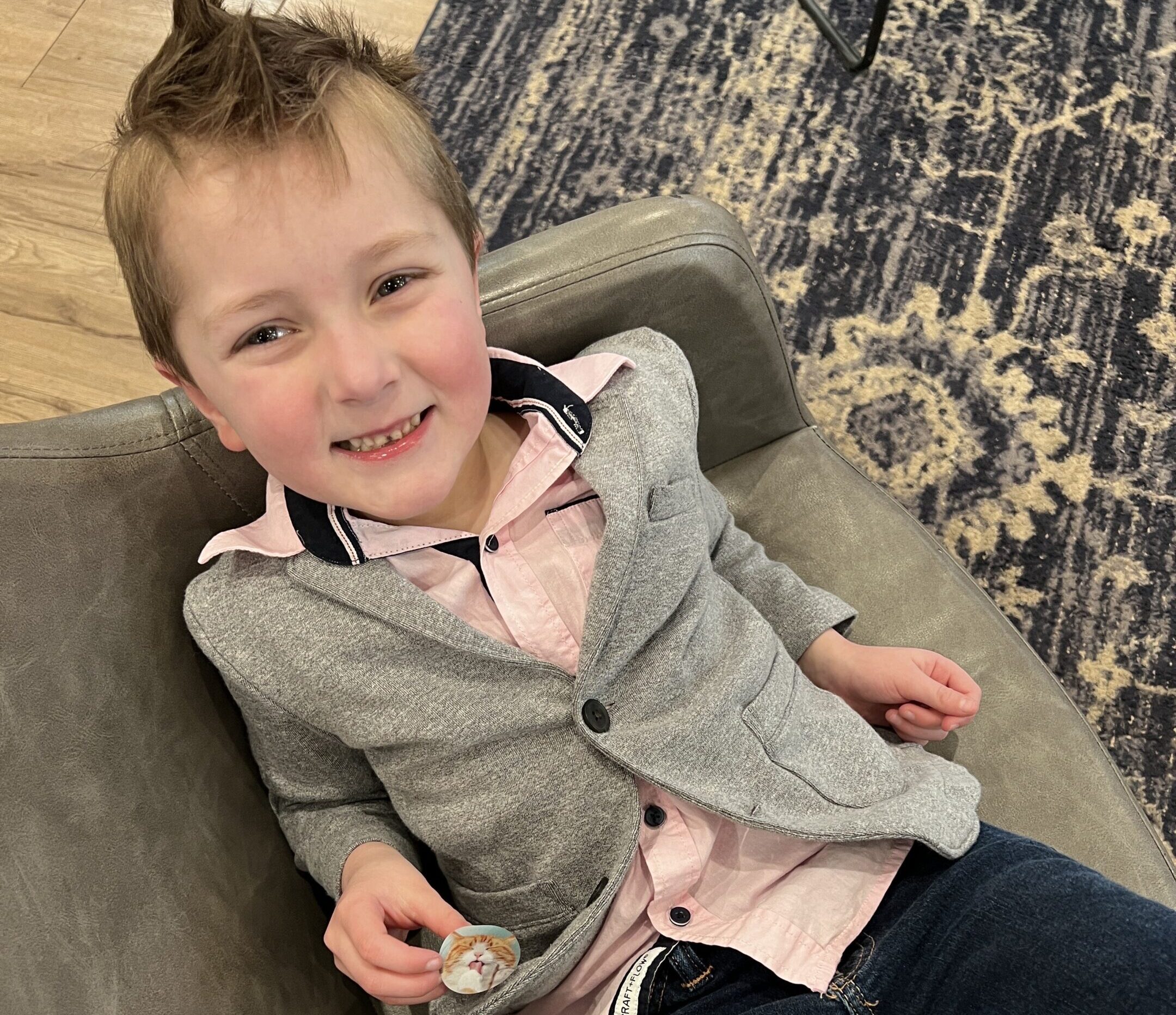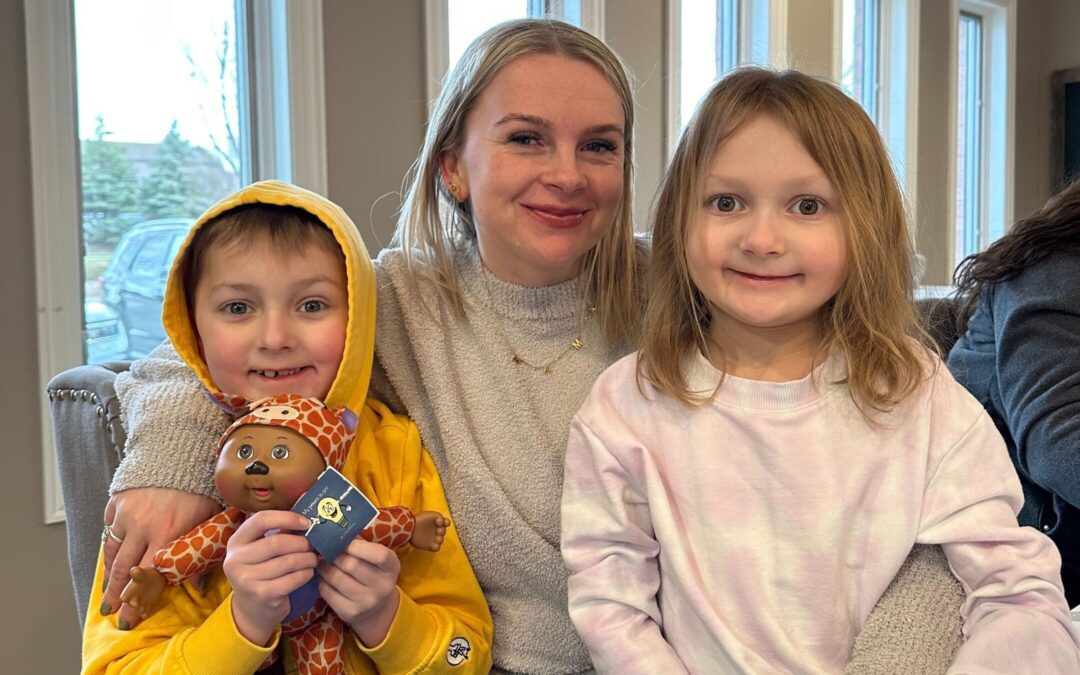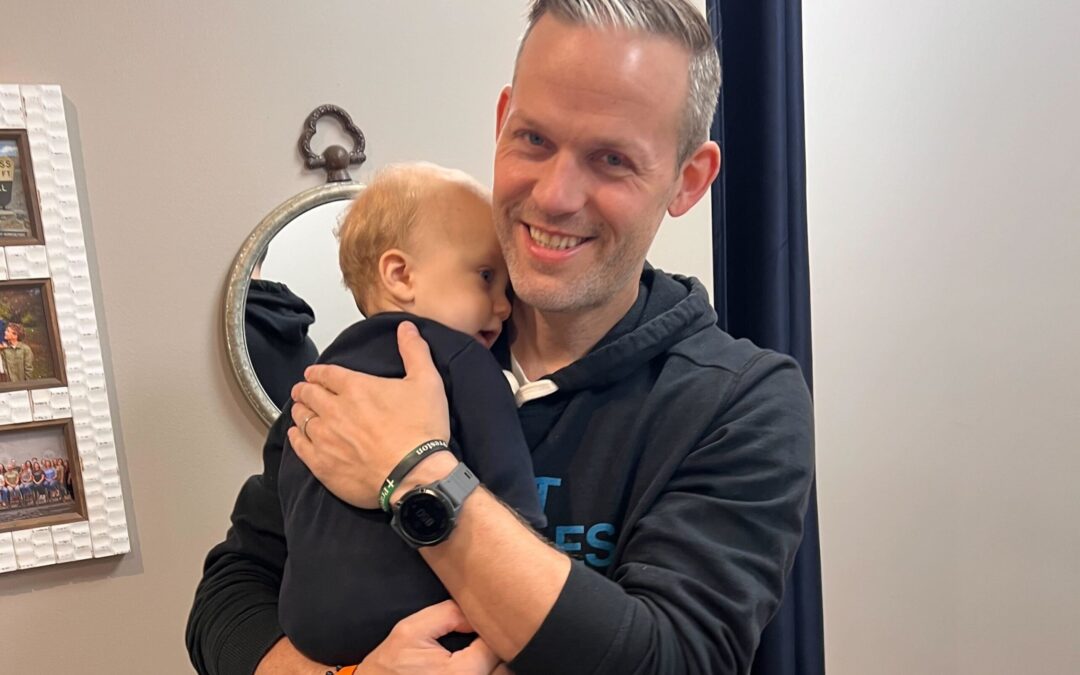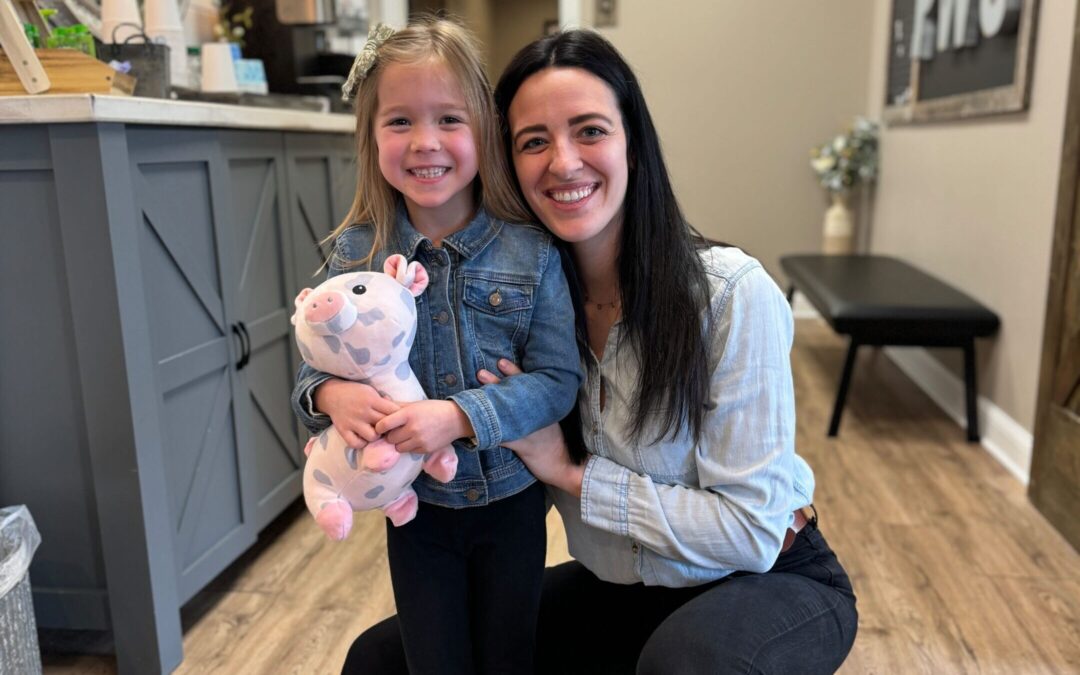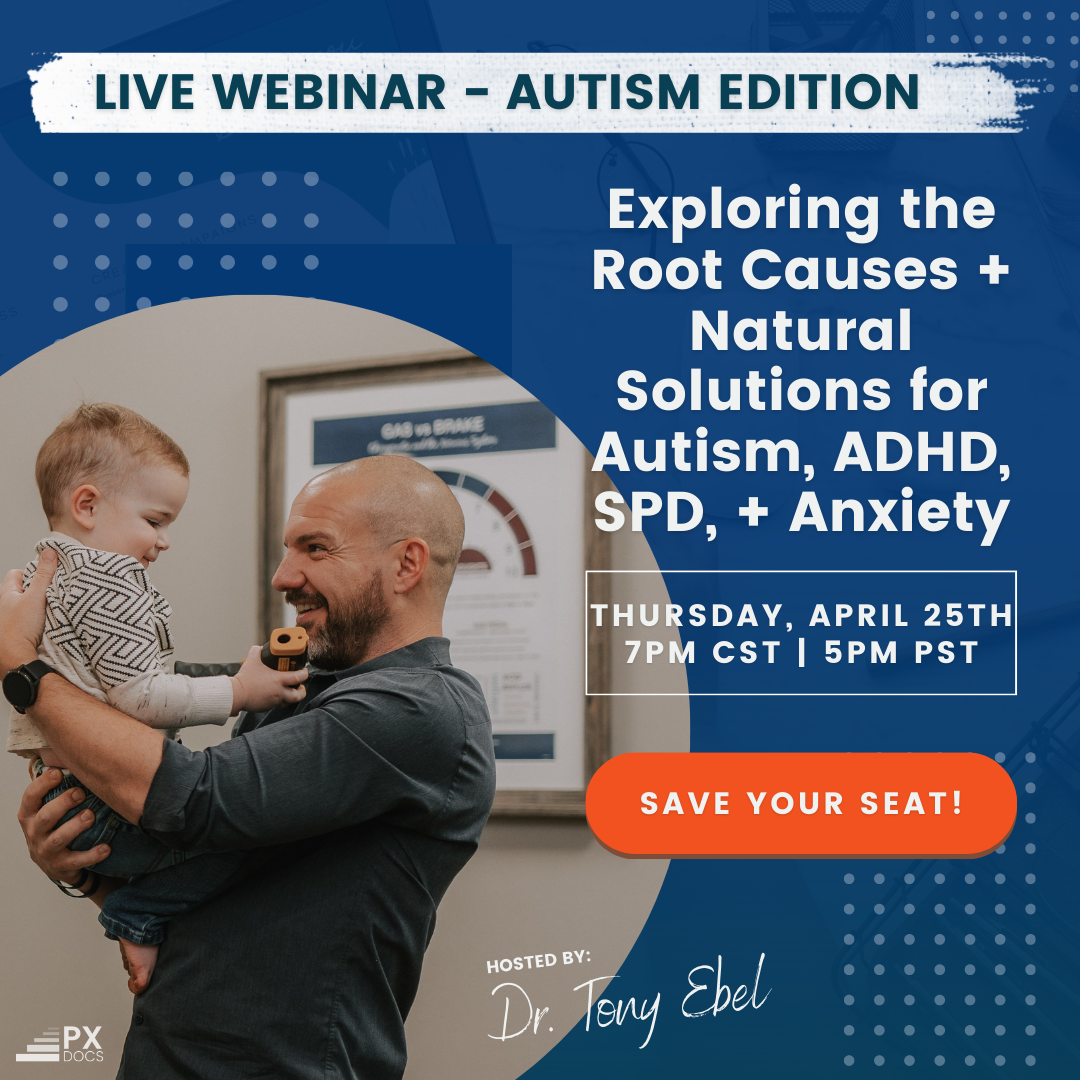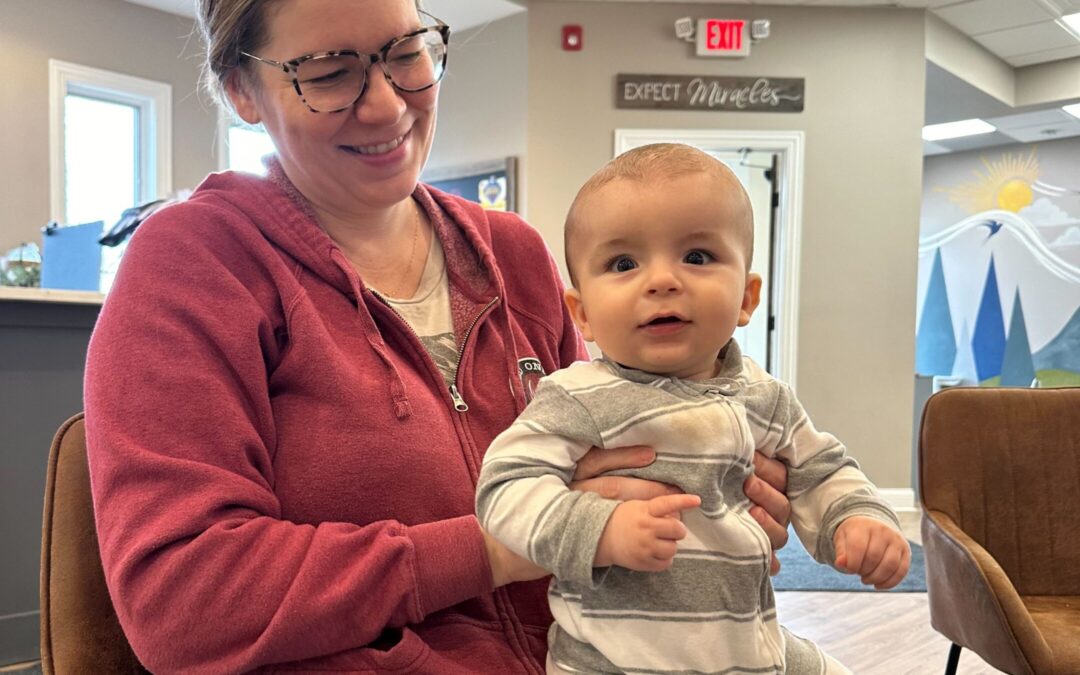I was desperate for answers. Our 7-year-old daughter, Reagan, refused to wear pull-ups at night because she saw her 3 and 5-year-old brothers didn’t have to wear them, so why should she? And frankly, I didn’t blame her at all for feeling this way. But it did make it more difficult to manage her Enuresis, also known as bedwetting, because her dad or I had to carry her to the bathroom every night around 10:30 pm after she had been sleeping for a couple of hours. If we didn’t, Reagan would almost certainly have an accident in her sleep.
Despite taking steps to address the issue, including putting her through a sleep study and seeking advice from the pediatrician, we were unable to find a solution. The Pediatrician’s response was always the same: “We’re not sure what’s wrong, but she’ll most likely grow out of it.”
Reagan’s bedwetting was not only frustrating for her dad and me but also significantly impacted Reagan’s self-esteem. She was self-conscious and upset about the situation, which only added to my concerns and heartbreak.
What is Enuresis?
Enuresis, also known as bedwetting or urinary incontinence, is involuntary urination, usually while asleep, after the age at which staying dry can reasonably be expected. It is a common challenge among children but can also affect adults. In general, bedwetting is considered to be a problem when it occurs at least twice a week for three consecutive months or more.
It is often a source of embarrassment and frustration for both the child and their parents, but it is important to understand that this is not the child’s fault and is entirely beyond their control.
There are actually 4 types of Enuresis. A child may have 1 or more of the following:
- Nighttime (nocturnal) Enuresis: This is when bedwetting during the night occurs, and it is the most common time of Enuresis.
- Daytime (diurnal) Enuresis: This is when wetting / accidents during the day happen.
- Primary Enuresis: This happens when a child has not fully mastered toilet training and has never managed to stay consistently dry during the day or night for a significant period.
- Secondary Enuresis: This is when a child has experienced a period of consistent dryness but then begins bedwetting and having periods of wetness again.
Symptoms of Enuresis?
Symptoms of Enuresis can be a bit different for each child, but as expected, the primary symptom of Enuresis is bedwetting, the involuntary release of urine during sleep. According to Health Encyclopedia, 1 in 10 children aged 7, 1 in 20 children aged 10, and 1 in 100 children older than 15 have at least 1 episode of nighttime enuresis.
In addition to bedwetting, children with Enuresis may also experience the following symptoms:
- Frequent urination
- Urgency to urinate
- Dribbling of urine during the day
Since Enuresis can disrupt a child’s sleep, this can lead to daytime sleepiness, irritability, and difficulty concentrating in school.
Causes of Enuresis?
There is a lot out in the traditional medical world as far as possible causes for Enuresis. A few are as follows:
- A small bladder: a child’s bladder may not be fully developed enough to hold urine at night.
- Inability to recognize a full bladder: if the nerves that control the bladder are slow to mature, a full bladder may not wake your child.
- Sleep Apnea: bedwetting can be a sign of obstructive sleep apnea.
- Diabetes: bedwetting could be the first sign of Diabetes.
- Chronic Constipation: the same muscles are used to control urine and stool elimination. When constipation is long-term, these muscles can become dysfunctional and contribute to bedwetting.
While I wasn’t sure about Reagan having a small bladder, none of these “causes” described Reagan. She did not have sleep apnea, which was ruled out by the sleep study, did not have diabetes, didn’t struggle with constipation, and had no trouble holding her urine while she was awake. I had a gut feeling that Reagan’s chronic ear infections, sleep challenges, and bedwetting had to be related.
Good thing I listened to my mom gut because that is when I found Neurologically-Focused Chiropractic Care through a friend’s recommendation. This specialized form of chiropractic care focuses on getting to the root cause of a child’s health challenges and then restoring and optimizing the function of their nervous system, which plays a vital role in every aspect of health, including bladder function.
Reagan’s story is a perfect example of the Perfect Storm and how a Pediatric Chiropractor can make a significant difference in a child’s health. The first step her chiropractor took was to dive deep into Reagan’s case history, tracing back to the root of her challenges. It is so common for these challenges to start as far back as pregnancy and birth trauma.
I had a very stressful and emotional pregnancy with Reagan, and my labor with her was lightning-fast, which can be a form of birth trauma. Reagan was extremely colicky for the first 5 months of her life, despite me making diet changes, cutting out dairy, etc. At that 5-month mark is when the chronic ear infections began, and she was on one round of antibiotics after another. This led to two different surgeries for two sets of ear tubes and adenoid removal. I was told over and over Reagan would grow out of this all.
At 11 months old, the Pediatrician also confirmed that she had low muscle tone, something I had been wondering and inquiring about, so she began physical therapy. The truth is, Reagan did not grow out of colic, ear infections, or low muscle tone; she grew into other challenges such as sleep issues, bedwetting, and ADHD.
Enuresis Care Options?
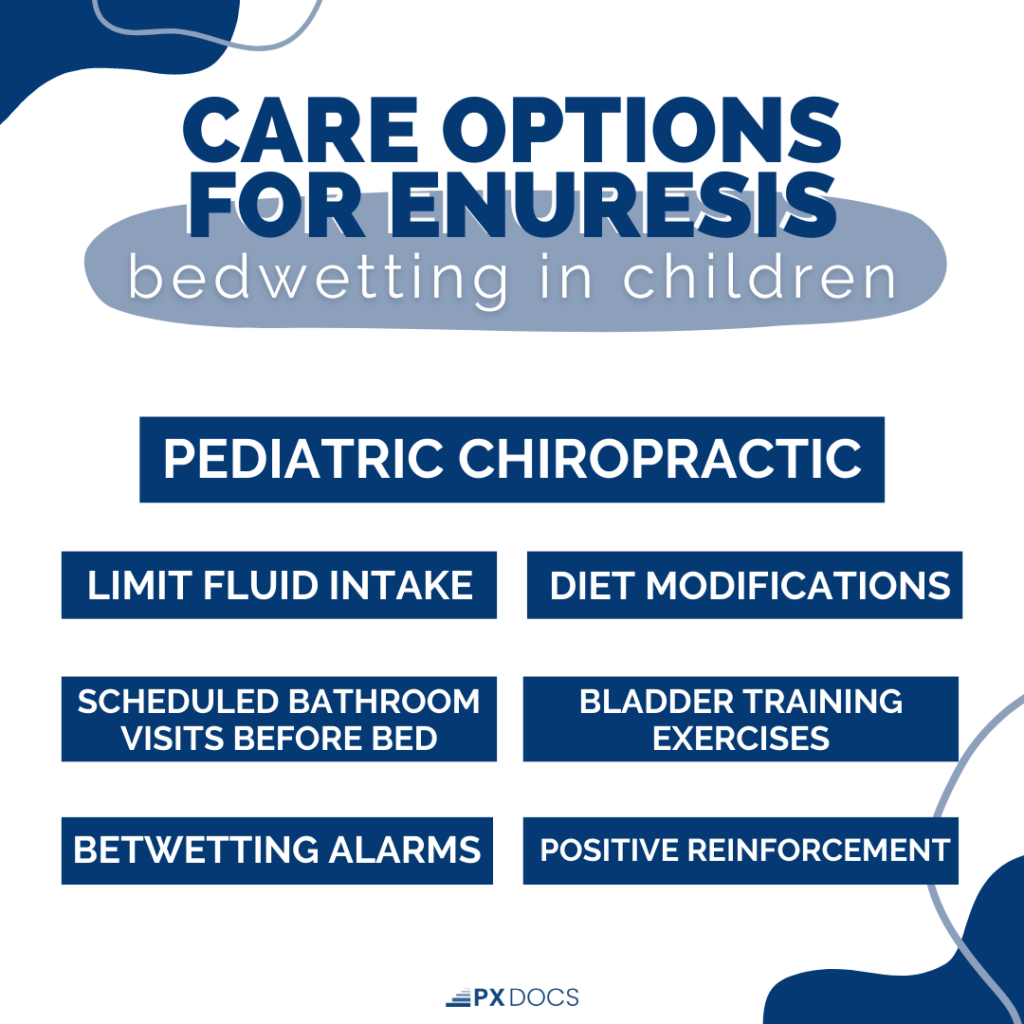
In many cases, a traditional medical doctor will not recommend treatments for Enuresis and tell the parents to wait it out. Some possible suggestions they may recommend are:
- Limit Fluid Intake
- Keep caffeine out of the child’s diet
- Night waking on a schedule
- Bladder training – bladder exercises and urinating on a schedule
- Moisture Alarm – a sensor that detects wetness
- Medication
- Therapy
While some of these ideas might help a bit, none of these options get to the root cause of Enuresis, and all of them attempt to simply prevent symptoms from happening or treat the symptoms in some way. I had tried many of these for Reagan, and none of them worked. And to wake a child that already has sleep issues at night to use the bathroom, which is what we had resorted to doing, didn’t make sense either and only worked to disrupt their sleep cycles even more.
Neurologically-Focused Pediatric Chiropractic Care
A Neurologically-Focused Pediatric Chiropractor in our PX Docs network will always be passionate about getting to the root cause of a child’s challenges. After consulting with a family and digging into the child’s case history, looking for the root causes, they will do a deep dive into the child’s function of the nervous system. They do this using incredible technology called the INSiGHT scans that can detect subluxation, dysautonomia, and vagus nerve dysfunction – which are all terms that mean a stressed-out, dysfunctional nervous system.
The Nervous System is the main hub and controls all of the other systems in the body, which means it is responsible for controlling the function of the bladder. So if the Autonomic Nervous System is subluxated, that means the rest of the systems are not communicating with the brain and firing signals as they should. If a child is struggling with a stressed-out nervous system not functioning properly, it’s no surprise the brain will have difficulty signaling to the child’s bladder to hold urine while the child is sleeping or to get up and use the bathroom.
In many cases, the child’s nervous system spends so much of the day extra wound up and stuck with an excessive sympathetic tone (dysautonomia), which stems from all the Perfect Storm stressors and challenges they went through, as we spoke of earlier. Then at night, the body is so worn out and fatigued from all of that excessive stress and tension that it “overreacts” and elicits an excessive parasympathetic response to try and balance things out, and therefore lets the bladder relax and release urine at a time it’s not supposed to.
After INSiGHT scans were performed on Reagan and subluxation was found in multiple places on her nervous system, she began a fully customized care plan that her Pediatric Chiropractor had put together. This care plan consisted of gentle adjustments to release the tension that had built up on her nervous system since she was a baby and then restore communication and connection between her brain and body, including her bladder.
After a couple of weeks, Reagan’s Enuresis completely went away. On top of that, since she started chiropractic care, she has not had any ear issues, her sleep has improved immensely, and she is an all-around happier, more confident child.
If your child is struggling with any type of Enuresis, please do not wait to find a PX Doc local to you on our directory today! No child should have to struggle with embarrassment and frustration about something they can not control due to a stressed out, subluxated Nervous System. The PX Docs Network aims to help your child achieve natural healing and optimal growth, enabling them to live their absolute best life!

